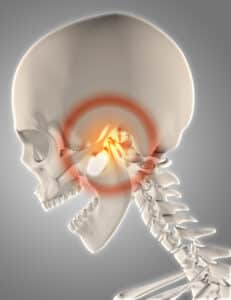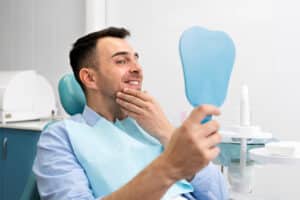Living with the daily discomfort of TMJ (Temporomandibular Joint) pain can be incredibly challenging. Persistent jaw pain, headaches, and difficulty in eating or speaking can significantly impact your quality of life. If you are one of the many individuals experiencing the burdensome symptoms of TMJ disorder, know that you are not alone. Orthodontics and TMJ disorder treatment can offer you relief and improve your overall well-being. At Smiles by Lorino, our team of experienced orthodontist in New Jersey understands the complexity of TMJ disorder and its impact on your life. With our specialized knowledge and state-of-the-art techniques, we are dedicated to helping you find lasting relief from your TMJ pain.
What Causes TMJ Disorder?
TMJ disorder can arise from various factors and underlying conditions. Understanding the causes can provide valuable insight into managing and treating the condition. Here are some common causes of TMJ disorder:
Misaligned Teeth/Incorrect Bite – Irregularities in the alignment of your teeth can create imbalances in how the jaw joint functions. This misalignment can lead to TMJ pain and discomfort.
- Jaw Trauma – Any injury or trauma to the jaw, such as a direct blow or impact, can disrupt the normal functioning of the temporomandibular joint and contribute to the development of TMJ disorder.
- Bruxism – Teeth grinding or clenching, a condition known as bruxism, can put excessive pressure on the jaw joint and surrounding muscles. Over time, this can lead to TMJ disorder and associated symptoms.
- Arthritis – Various forms of arthritis, such as rheumatoid arthritis or osteoarthritis, can affect the temporomandibular joint. The inflammation and deterioration of the joint can contribute to TMJ disorder symptoms.
- Stress and Tension – Emotional stress and tension can lead to increased muscle tension in the jaw and face. Chronic stress can result in habitual clenching or grinding of the teeth, exacerbating TMJ disorder symptoms.
- Poor Posture – Postural habits, such as slouching or forward head posture, can impact the alignment of the jaw and lead to TMJ issues. Improper alignment puts strain on the joint and surrounding structures.
- Genetics – In some cases, TMJ disorder can have a genetic component. Certain individuals may inherit structural abnormalities or predispositions that increase their likelihood of developing TMJ-related symptoms.
- Hormonal Factors – Hormonal changes, such as those experienced during pregnancy or menopause, can contribute to TMJ disorder. Fluctuations in hormone levels can affect the stability of the jaw joint.
Why Get Treatment?
TMJ disorder affects the joint that connects your jawbone to the skull, causing a range of debilitating symptoms. Whether it’s the sharp, shooting pain when you try to eat, the throbbing headaches that disrupt your daily routine, or the constant discomfort that leaves you feeling exhausted, the impact of TMJ disorder can be overwhelming. But there is hope. Effective treatment options exist to address the underlying causes of TMJ disorder and alleviate its symptoms, providing much-needed relief.
It’s important to understand that TMJ disorder is not a condition you have to endure silently or accept as a normal part of life. Seeking professional treatment is crucial for several reasons. Firstly, untreated TMJ disorder can lead to further complications, such as chronic pain, increased dental problems, and even psychological distress. Secondly, the sooner you seek treatment, the better the chances of successfully managing and reducing your symptoms. By addressing TMJ disorder early on, you can prevent the condition from worsening and potentially avoid more invasive interventions down the line.
Getting the right treatment for TMJ disorder is about more than just managing pain. It’s about regaining control over your life, improving your overall oral health, and restoring your ability to enjoy everyday activities without discomfort. Through a comprehensive approach that may include orthodontics, medication, physical therapy, or other suitable treatments, you can find relief from TMJ pain and experience a significant improvement in your well-being.
Orthodontics and TMJ Disorder
Orthodontics plays a vital role in the treatment of TMJ disorder. By addressing the underlying causes of misaligned jaws or improper bite, orthodontic treatment can help alleviate the symptoms associated with TMJ disorder. Let’s explore some of the orthodontic treatment options available:
- Braces – Traditional braces are a common orthodontic treatment used to correct misaligned teeth and jaws. By applying gentle pressure, braces gradually move teeth into their proper positions, improving jaw alignment and reducing TMJ-related symptoms. Braces offer precise control over tooth movement, providing long-term benefits for TMJ disorder patients.
- Invisalign Aligners – Invisalign offers a discreet and comfortable alternative to traditional braces. These clear aligners are custom-made to fit snugly over your teeth and gently shift them into proper alignment. Invisalign New Jersey aligners can help improve jaw positioning and alleviate TMJ-related discomfort while providing the added advantage of being virtually invisible.
- Orthopedic Appliances – Orthopedic appliances, such as splints or mouthguards, are commonly used in TMJ disorder treatment. These custom-made devices help stabilize the jaw, reduce clenching or grinding, and minimize stress on the TMJ. Orthopedic appliances can provide relief from TMJ-related pain and protect the teeth from further damage caused by bruxism.
- Surgical Orthodontics – In some cases of severe TMJ disorder, surgical orthodontics may be recommended as a treatment option. Surgical orthodontics combines orthodontic treatment with surgical procedures to address complex jaw and bite issues. It involves collaboration between an orthodontist and an oral surgeon to correct underlying skeletal problems that contribute to TMJ disorder. Surgical orthodontics can help reposition the jaws, align the bite, and improve overall jaw function. While it is a more invasive approach, surgical orthodontics can provide significant long-term benefits for patients with severe TMJ-related concerns.
How to Get Orthodontic Treatment for TMJ Disorder
It’s important to note that orthodontic treatment for TMJ disorder should be part of a comprehensive approach. Depending on the severity of your condition, other treatment options may be recommended, such as medication, physical therapy, or even surgery. A thorough evaluation by an experienced orthodontist New Jersey, like those at Smiles by Lorino Orthodontics, can determine the most appropriate course of treatment for your specific needs.
At Smiles by Lorino Orthodontics, we understand the significant impact TMJ disorder can have on your daily life. That’s why we offer comprehensive orthodontic services to address TMJ-related concerns. Whether you need braces, surgery, or Invisalign New Jersey, our expert orthodontists will conduct a thorough evaluation and develop a personalized treatment plan tailored to your unique situation.
Consult Smiles by Lorino in Franklin Lakes, Long Hill, Belleville, Wayne & Kearny, NJ
Take control of your TMJ disorder and experience the transformation you deserve. Schedule a consultation with our orthodontist in New Jersey Dr. Robert Lorino and the dedicated team at Smiles by Lorino Orthodontics. With our commitment to exceptional orthodontic care, state-of-the-art treatments, and comfortable patient experience, we proudly serve the areas of Franklin Lakes, Long Hill, Belleville, Wayne, and Kearny, NJ.
Don’t let TMJ disorder hinder your quality of life any longer. Discover the power of an orthodontic treatment in addressing your TMJ concerns and achieving a pain-free, confident smile. Contact us and take the first step towards a healthier, more comfortable future. Your smile deserves nothing less than the best care from Smiles by Lorino Orthodontics.



 Misaligned Teeth/Incorrect Bite – Irregularities in the alignment of your teeth can create imbalances in how the jaw joint functions. This misalignment can lead to TMJ pain and discomfort.
Misaligned Teeth/Incorrect Bite – Irregularities in the alignment of your teeth can create imbalances in how the jaw joint functions. This misalignment can lead to TMJ pain and discomfort.